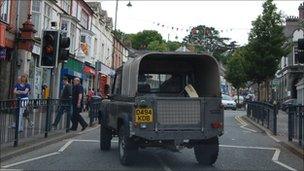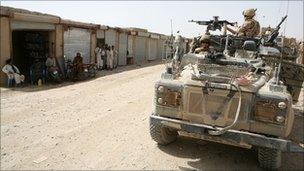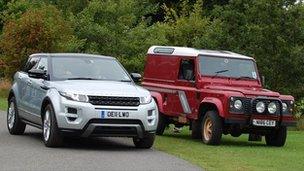Range Rover Evoque highlights Land Rover Defender shortcomings
- Published
Is the Evoque better than the Defender?
The Land Rover Defender has become an automotive icon, remaining largely unchanged since the first Land Rover was introduced in 1948, before going on to enjoy sales of more than two million around the world.
Now the carmaker has confirmed that it will release an all-new version of the Defender in 2015.
A concept car on which the new Defender will be based is set to make its public debut at next month's Frankfurt motor show.
Arguably, the overhaul cannot come too soon for a vehicle that now feels hopelessly outdated next to the company's latest offering, the Range Rover Evoque.
Going from a rugged Defender to a flashy-looking Evoque is a major step.
However, whether it is a step in the right direction is not clear - it really depends on what you want.
'Best-selling model'
With its roomy, minimalist cabin and a square body, which many say only looks better once it has had a few knocks, the current Defender is obviously better suited as a serious workhorse.
But for the fashion-conscious who prefer a more comfortable ride and a lavishly fitted out interior, the Evoque might be a better bet.
The same may well be true for Jaguar Land Rover (JLR), the UK-based Tata Motors subsidiary that hopes to boost the profits it makes from both Range Rover and Land Rover vehicles.
Land Rover is eager to conquer new markets at a time when competent rivals are enjoying great success in attracting farmers, workers and soldiers, offering them working vehicles that are often both better and cheaper than the Defender.
Land Rover's global brand director, John Edwards, is hopeful the Evoque's lightweight construction and relatively low fuel consumption and emissions make it well suited to the job.
"This car will be our best-selling model," he says in an interview with BBC News, predicting that it will outsell Land Rover's Freelander, Discovery and Defender models, as well as the full-size Range Rover and Range Rover Sport.
"The sports utility vehicle (SUV) market is growing, but downsizing, and the premium market is growing in general," he observes. "This meets those two trends quite well."
Crowned Car of the Year 2011 by Auto Express, the Evoque is expected to broaden Land Rover's customer base.
About half the buyers of the compact Evoque SUV are expected to be women, compared with just a quarter of Land Rover's current customers, and it is also expected to appear to a younger audience.
Many of them will probably opt for a cheaper and more frugal two-wheel-drive version, rather than one kitted out with four-wheel-drive.
Moreover, some 80% of the Evoques, which will be made at Land Rover's Halewood factory, will be sold abroad.
"We intend it to be a global car," Mr Edwards says.
Range Rover taking over
But the Evoque is more than just a response to the market, according to Land Rover's managing director, Colin Green.
"With previous cars like the Freelander and Discovery, we've been looking at emerging segments, whereas with the Evoque we're trying to identify 'white space'," he tells BBC News in an interview.
"The design has led the package, rather than the functionality leading the design."
That seems to be a major change in philosophy for Land Rover, which has traditionally been one of the most pragmatic, problem-solving companies in the motor industry.
It is also a strategy that is changing the company's makeup, with its upmarket Range Rover models destined to outshine its Land Rover models.
"I think Range Rover will make up more than 50% of sales by 2030," Mr Green says.
Capable offroad vehicle
This might suggest a shift away from the company's core offroad values.

The Land Rover Defender is 'long in the tooth', the company acknowledges
But Mr Edwards is eager to stress that the Evoque is "just as capable, if not more capable on some surfaces, than some of our other models".
"They offer luxury, plus the Land Rover capability," he says.
Driving the Evoque on rutted tracks in Snowdonia makes it clear that the company's smaller, cheaper Range Rover is not a soft-roader. It is a perfectly able offroad vehicle, even when faced with fairly serious challenges.
And with most of its offroad capabilities controlled by electronics, such as an adaptive damping system, it is also much smoother in the rough, with little room for human error by the button-pressing iPad generation that is expected to be buying it.
Still relevant
That prompts the question: redesign or no redesign, is the Defender quite simply obsolete?

Relying on military customers is tricky, Land Rover bosses say
"It's very long in the tooth," acknowledges Mr Edwards, though he nevertheless insists the Defender remains relevant.
"It's very important that we don't forget Land Rover and its capability. We are working very hard on the non-Range Rover badge products in our range.
"Replacing [the Defender] is going to be quite a challenge, but also an opportunity," says Mr Edwards. "But we're definitely doing it.
"We'll want to replace the car as it currently occupies the market. We certainly don't want to move it upmarket and become a sort of 'Range Rover Defender'. That doesn't work at all."
New Defender
"One of our problems in the past looking to replace the Defender has been to get the business case together," observes managing director Mr Green. "Military contracts are fine, but you might get 5,000 orders one year, 200 the next."

Land Rover believes its models are equally capable offroad, in spite of their different looks
A more promising market might be in developing countries such as Brazil, Russia, India and China, where working vehicle sales are booming in parallel with rapid economic growth that is predicted to continue for decades yet.
To succeed in these markets, a new Defender will need to be able to compete on both price and quality. It will need to be both cheaper - so the cost of production will need to come down - and better, in terms of both capabilities and fuel economy.
And that may well prove an even trickier challenge than the creation of an urban warrior with designer looks.